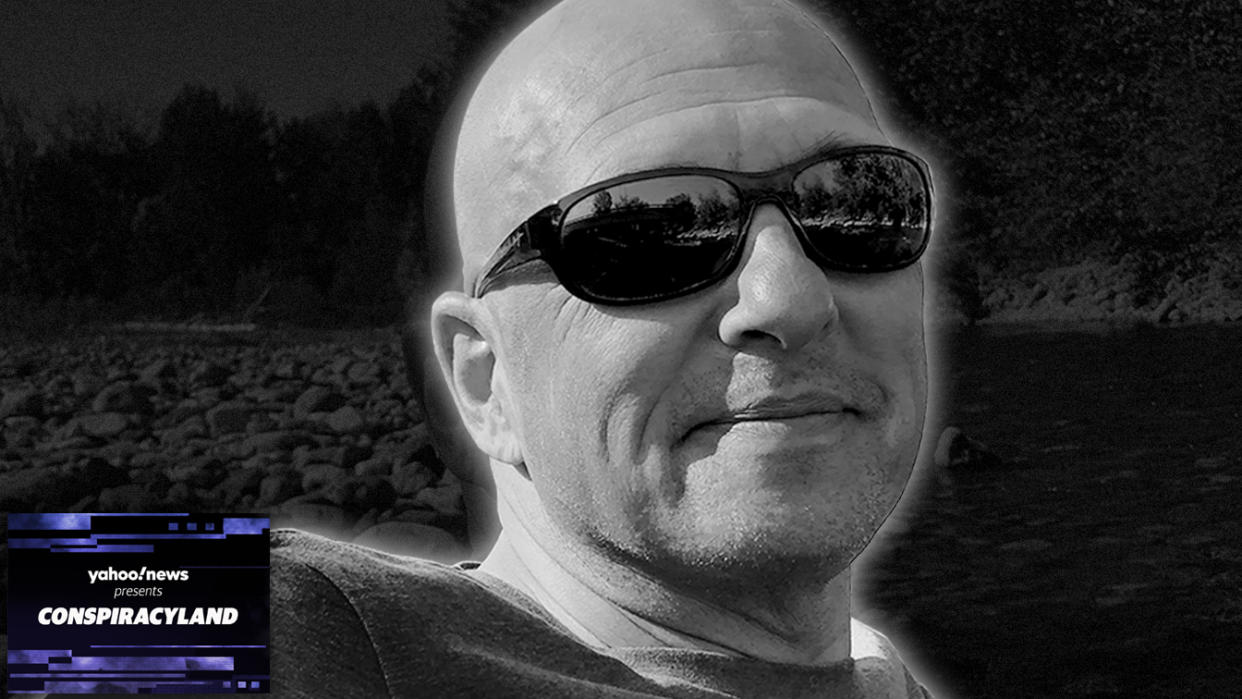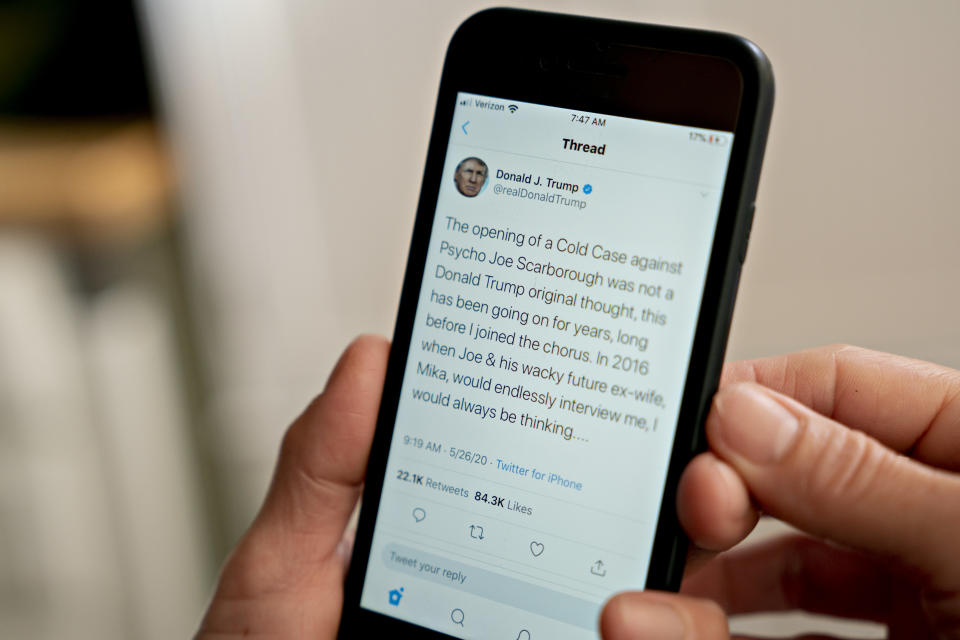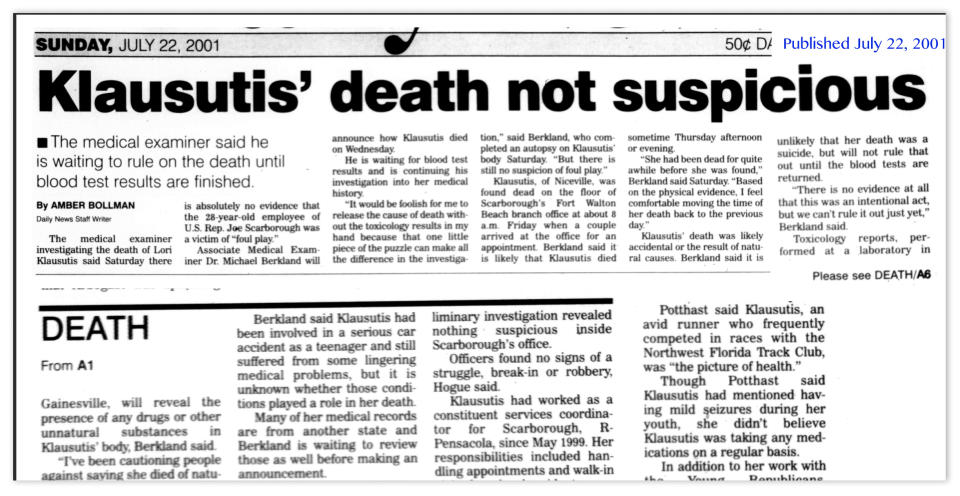Husband of Scarborough aide who died in 2001 speaks out about Trump's conspiracy tweets: 'It's just inhuman'

The widower of a onetime aide to Joe Scarborough, the former congressman turned MSNBC host, told Yahoo News in a series of emotional interviews that the conspiracy theories about the death of his wife — promoted by President Trump on Twitter and embraced by the devotees of the QAnon conspiracy cult — have caused “inhuman” pain and anguish for him and his late wife’s family.
“It got to the point that I literally could not stomach this,” T.J. Klausutis, an Air Force engineer, said in exclusive interviews for a new three-episode season of the Yahoo News podcast “Conspiracyland.” Titled “A Death in Florida,” the “Conspiracyland” series explores the circumstances surrounding the July 2001 death of Klausutis’s wife, Lori, and how they triggered nearly two decades of conspiracy theories, first pushed by liberal bloggers and more recently adopted and turbocharged by Trump and his allies.
“I’ll use the term ‘suffering,’ quite honestly,” Klausutis said about the impact of the steady barrage of social media postings, complete with malicious and demonstrably false claims, about what happened to his wife. “And nobody, and I mean nobody, should have to be used in such a fashion. ... It’s just inhuman.”
Klausutis, who designs navigation guidance systems for the U.S. military, is speaking out publicly for the first time, three months after he wrote a poignant letter to Twitter CEO Jack Dorsey, pleading with him to take down the president’s tweets about the death of his wife. It was a plea that, once made public, reverberated throughout Silicon Valley and, in the view of some analysts, prodded social media companies to become more aggressive about policing the disinformation and baseless conspiracy theories that proliferate on their platforms.
Subscribe and download: “Conspiracyland” on Apple Podcasts
But Twitter has yet to take down Trump’s tweets about Lori Klausutis — a stance that continues to infuriate her husband. A medical autopsy found that, while working in the Fort Walton Beach, Fla., office of then-Rep. Scarborough in 2001, she died in a tragic accident caused by an undiagnosed heart condition. The local police found no evidence of foul play.
Yet Trump, seeking revenge against the TV host over his relentless criticism on his MSNBC show, “Morning Joe,” launched repeated attacks this spring on “Cold Case Joe” Scarborough, suggesting that the ex-congressman may have murdered his aide and that she had been his “girlfriend.” (Scarborough, now 57, was elected to Congress in 1994 as a Republican and served three terms and part of a fourth before resigning in 2001, saying he wanted to spend more time with his children.)
T.J. Klausutis, a powerfully built, 6-foot-3-inch biking enthusiast with a PhD in electrical engineering, sought to be careful and measured about any references to the president during his interviews for “Conspiracyland.” He was mindful — as he has been warned by the Air Force — that as a civilian employee of the Defense Department he is bound by the Hatch Act, which forbids him to make public comments aimed at influencing the election. But he bristled and grew angry at the suggestions, echoed by the president, that his wife had had a sexual affair with Scarborough.
“It’s complete nonsense,” Klausutis said. “It’s just disgusting.” He noted that when his wife encountered the then-congressman at a fundraising event in 2000, the year after she began working for him, it was instantly clear that Scarborough wasn’t even sure who she was.

“I remember when she walked up and she got introduced to Joe and someone goes, ‘Oh, this is, this is Lori from,’ you know, and you just saw that he didn’t recognize her and didn’t know her,” Klausutis said. “And I was standing right there.” (On the day of her death in Fort Walton Beach, Scarborough was 1,000 miles away voting on the floor of the House of Representatives. He has said he recalls meeting Lori Klausutis on three occasions, and last May on “Morning Joe” he denounced the president for tweeting about the case, saying, “The cruelty is unspeakable.” Scarborough declined to be interviewed for “Conspiracyland,” saying he did not want to give the story any more attention.)
Trump’s conspiracy-mongering about the death of Lori Klausutis is a vivid example of the power of the president’s tweets to ignite firestorms on social media, no matter how tenuous their relationship to verifiable facts. Since Trump began tweeting about Scarborough’s supposed role in her death — once in 2017 and then 10 times between April 30 and May 27 of this year — the claims ricocheted throughout social media and were then echoed and embellished by the president’s political allies. “When will they open a Cold Case on the Psycho Joe Scarborough matter in Florida,” Trump tweeted on May 12. “Did he get away with murder? Some people think so. Why did he leave Congress so quietly and quickly? Isn’t it obvious? What’s happening now? A total nut job!”
Those and other presidential tweets about the case were retweeted 239,000 times and earned 873,400 likes. Mentions on Twitter of “Cold Case Joe,” Lori Klausutis and other aspects of the case, which had been averaging a little over 100 a day, skyrocketed after the president began churning out his tweets, reaching 588,788 during the month of May, according to Zignal, a social media research firm that analyzed the impact of Trump’s tweets for “Conspiracyland.” (That figure includes the retweets of Trump’s attacks on the MSNBC anchor.)

Perhaps even more significant is who picked up on Trump’s tirades. Among them were arch conspiracy theorists like internet entrepreneur Matt Couch and Washington lobbyist Jack Burkman, both of whom had previously pushed the idea that former Democratic National Committee staffer Seth Rich, who was killed in 2016 in what D.C. police say was a botched street holdup, had been assassinated over his supposed involvement in the leaking of DNC emails to WikiLeaks. Rich’s family has also denounced the posthumous slur against him. Special counsel Robert Mueller and a recent Senate Intelligence Committee report both rejected the idea that there was any connection between Rich and WikiLeaks.
Another group of Twitter users who echoed Trump’s claims — accounting for about 10 percent of the total mentions on Twitter, according to Zignal — were followers of QAnon, a bizarre conspiracy cult that believes Trump is engaged in a hidden struggle with a “deep state” cabal of pedophiles and Satan worshipers. A supposed intelligence community insider who calls himself Q has developed a large following for his cryptic hints about the plot. QAnon believers, including some veterans of the Pizzagate hoax — about a child-trafficking ring involving Hillary Clinton and her associates and based in the basement of a Washington pizza parlor — have pointed to Trump’s tweets as support for the idea that Lori Klausutis was murdered by Scarborough. “This clearly makes me think that Donald Trump knows something,” declared one QAnon follower, reading from one of the president’s tweets, in a posting on a fringe website called Bitchute. “He wouldn’t be pushing this if he didn’t.”
In another posting, a QAnon follower asserted that Klausutis had been “suffocated” by U.S. special forces operatives after she was found to be reading highly classified and “explosive” documents revealing “deep state” complicity in the Sept. 11 terror attacks, the 1995 Oklahoma City bombing and the supposed assassination in 1999 of John F. Kennedy Jr. (Describing the claims as preposterous, T.J. Klausutis noted that his wife didn’t even have a security clearance that would have given her access to any secret documents.)
Those postings, as deranged as they seem, are illustrative of the symbiotic relationship between Trump and the QAnon cult, says Joseph Uszinski, a University of Miami political scientist and the author of a book on American conspiracy theories.

QAnon believers “follow Trump’s tweets very closely, because they see Trump as working with Q and with them against the ‘deep state,’” Uszinski said in an interview on “Conspiracyland.” “So everything that Trump tweets they look at, and decipher, and decode. Every Trump tweet to them has some sort of subterfuge going on — there’s a secret message that only they can know.”
Last month Trump praised a QAnon follower, Marjorie Taylor Greene, as a “future Republican star” after she won a GOP primary for a U.S. House seat in Georgia, in a district she is almost certain to win. And when asked recently about QAnon, Trump pointedly refused to disavow or distance himself from the cult. “I don’t know much about the movement other than I understand they like me very much, which I appreciate,” he said. “I have heard that it is gaining in popularity, and … I’ve heard these are people that love our country.”
The “Conspiracyland” series is based on several hours of interviews with T.J. Klausutis as well as with his wife’s friends and colleagues, the medical examiner who conducted her autopsy and two distinguished pathologists who reviewed the autopsy report at the request of Yahoo News. Also interviewed was Lt. Mark Hayse, the commander in charge of investigations in the Fort Walton Beach Police Department, who completely rejected the president’s call to reopen a probe into Lori Klausutis’s death. “No, this case is closed,” he said in an interview. “Everything appears to be what it was determined to be — accidental, nothing suspicious. … This is not a murder case.”
The series examines Lori Klausutis’s work for Scarborough and the origins of the internet conspiracy theories that started circulating among liberal partisans and activists within weeks of her death — long before Trump or the QAnon cult picked up on them.
Those conspiracy theories were driven at first by the media’s saturation coverage of the summer 2001 disappearance of government intern Chandra Levy, who had been having an affair with Democratic California Rep. Gary Condit. When Michael Berkland, the deputy medical examiner for the judicial district where Fort Walton Beach is located, was first alerted by his assistant that Lori Klausutis’s body had been found in Scarborough’s office (“Well, I’ve got a dead secretary in a congressman’s office,” she told him), he immediately thought the incident might blow up in the media in the same way the Condit-Levy saga had.

In fact, the circumstances were quite different. Klausutis, a graduate of the University of Georgia, was not a secretary or an intern like Levy. She was a 28-year-old constituent service coordinator in Scarborough’s Fort Walton Beach office, a tiny two-room satellite office about an hour east of the congressman’s main district office in Pensacola and one that Scarborough himself rarely visited. She was, according to her friends, bubbly and vivacious, a devout Catholic who sang in the local church choir, wore a “precious little feet” pin that is a symbol of the pro-life movement and served as president of the local Young Republicans club.
She also appears to have been totally devoted to her husband. When Mary Potthast, a friend of hers from the Young Republicans and the church choir, called Klausutis on the afternoon of July 19, 2001, and asked her to commit to knocking on doors for a local GOP candidate that weekend, Klausutis told her she wasn’t available because T.J., who was out of town for meetings at the Pentagon, was due back and she needed to spend all her time preparing to clean the house and get ready for him. “She didn’t want to have any house chores or anything left to do other than to spend time with him,” Potthast said.
That conversation, about 4:30 in the afternoon, was one of the last Lori Klausutis ever had. The next morning a couple arrived at Scarborough’s office a little after 8 a.m. to discuss a work permit issue and found Klausutis dead, lying flat on her back on the floor next to her desk, fully dressed, with foam and blood coming from her mouth and nose. Police rushed to the scene. According to a detailed police report, the officers found no sign of any intruder, no sign of any struggle or defensive wounds on her body and, as they repeated over and over, no sign of any foul play.
But her death seemed a puzzle until a month later, when Berkland, the deputy medical examiner, released his report. He had discovered that Klausutis had a previously undiagnosed mitral valve anomaly, which can cause cardiac arrhythmia. His conclusion: She had experienced an arrhythmia that caused her to faint, lose consciousness and bang her head against her desk, resulting in brain injuries that proved fatal.

Berkland told “Conspiracyland” he is “100 percent” confident in his findings. “It may not have been the answer that everybody was looking for, but this is the scientific answer as to what happened,” he said.
What was the answer everybody was looking for?
“Oh, I think a lot of people back at the time would have been happy to blame Joe Scarborough for the death, and it would have just been another sensational case and stuff like that,” he said. “But Joe didn’t have anything to do with this death. Period.”
And yet there were a number of anomalies and oddities that would provide grist for the conspiracy theorists. Scarborough fueled some of them himself because he had abruptly announced his resignation from Congress just a few months earlier, giving rise to speculation over why he would give up his political career so suddenly. In announcing the resignation, Scarborough, his voice quivering with emotion, told reporters he wanted to spend more time with his children. A security guard initially told police that he had locked up the office on the evening of July 19 — then later changed his story, acknowledging he had failed to do so.
But most of all, there were questions about Berkland and whether his findings could be trusted. In 1996 he had been fired as the medical examiner in Jackson County, Mo., for failing to complete timely autopsies and finish all the work he claimed to have done. Then in Florida in 2003 he was fired again for similar reasons and even lost his medical license.
And finally, in 2012 — 11 years after Lori Klausutis’s death — Berkland was arrested and charged with improper storage of hazardous waste after police found hearts, brains and other body parts stored in Styrofoam cups and ziplock bags in a storage locker he used. They were the remains of private autopsies he had conducted over the years, not from official autopsies in forensic investigations.
The charges were later dropped after Berkland agreed to enter a pretrial intervention program. And he insisted in his “Conspiracyland” interview that none of the charges against him involved accusations that any of his autopsies were wrong. “Conspiracyland” asked two prominent pathologists — Dr. Cyril Wecht, the former medical examiner in Allegheny County, Pa., and Dr. Jonathan Arden, the former medical examiner in Washington, D.C. — to review Berkland’s autopsy report on Klausutis. Both offered the same conclusion: There was no reason to question his findings.

“Whatever he may have done of an inadequate, improper nature in the past is certainly not reflected in this particular autopsy report, which is quite thorough, detailed and something even more than you find in regular forensic pathology, autopsy protocols,” Wecht said.
Arden offered the same conclusion, citing in particular Berkland’s findings that the injuries to Klausutis’s brain were what pathologists call a contrecoup — on the opposite side of the abrasions found on her head. That is consistent with cases in which a person’s head slams into an immovable object, like a desk. This is opposed to a “coup” injury, in which the head is hit by a moving object, such as a baseball bat or a weapon, causing damage to the brain on the same side where the person has been hit.
“The pattern of her brain injury is not consistent with her having been struck by an object, such as an assailant,” Arden said. “I think Dr. Berkland was correct when he put all the facts and evidence together that her head trauma was the result of a fall. I see nothing suspicious in her death.”
And yet that summer, just as the media frenzy over Chandra Levy was reaching its peak, liberal and Democratic partisans began to insist that the Republican Scarborough be given the same level of scrutiny as the Democrat Condit, who was being widely accused of having been involved in Levy’s disappearance. (Years later, Levy’s body was found in Washington’s Rock Creek Park and another suspect was charged with and convicted of her murder. Although the conviction was later vacated on technical grounds, prosecutors, convinced the suspect was guilty, arranged to have him deported to El Salvador.)
In postings on sites such as the Democratic Underground, Truthout and the message board of the left-leaning American Prospect, writers sought to poke holes in the findings about Klausutis’s death and to suggest, without any evidence, that powerful figures in the Florida Panhandle were covering up Scarborough’s involvement. “With Lori Klausutis, it seems possible that a corrupt North Florida establishment is determined to keep the lid on the case, even if that means silencing the news,” read the entry on the American Prospect site.
All this caused T.J. Klausutis no end of grief. He read the blog postings intensely. He complained to the local newspaper about its coverage of the case, even though the paper never endorsed any of the conspiracy theories. And he grew ever angrier about the slurs on his deceased wife’s reputation.
“I had gotten obsessed with it,” Klausutis said. “And so I want to scream about this.”
In the years to come, T.J. Klausutis would have much more to scream about.
_____
Read more from Yahoo News:


